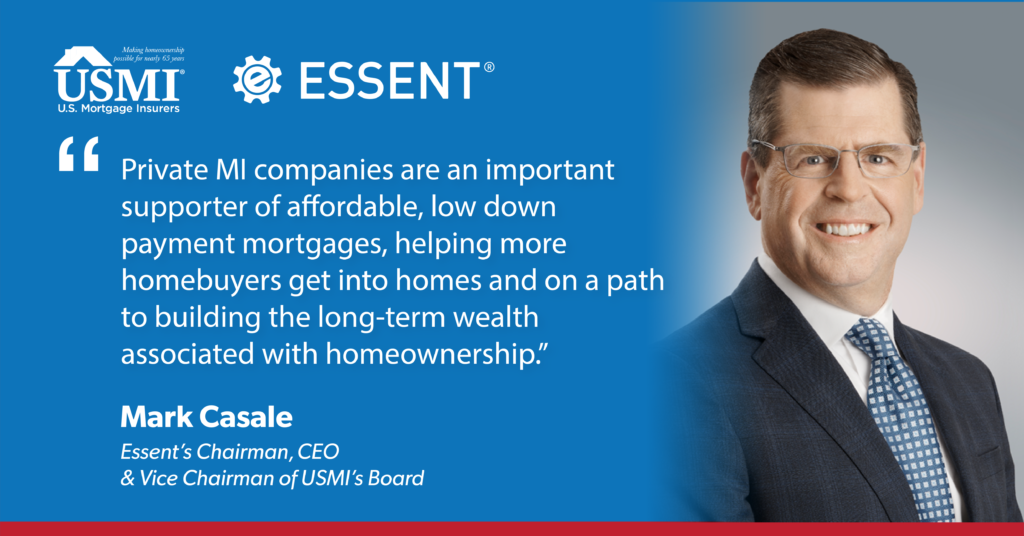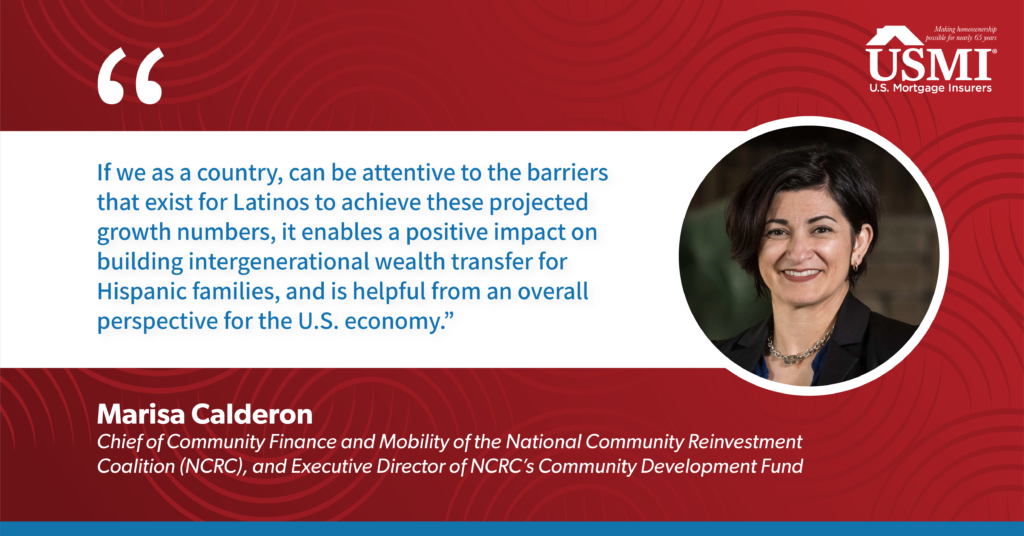WASHINGTON — U.S. Mortgage Insurers (USMI), the association representing the nation’s leading private mortgage insurance (MI) companies, submitted a comment letter to the Federal Housing Finance Agency (FHFA) on its Request for Input (RFI) on “Enterprise Equitable Housing Finance Plans” (the Plans), which articulates a framework by which the government-sponsored enterprises (GSEs or Enterprises), Fannie Mae and Freddie Mac, will be required to prepare and implement three-year plans to advance equity in housing finance.
“USMI commends the FHFA for soliciting feedback on the Plans to identify the barriers to sustainable housing opportunities, set goals to address those barriers, and implement policies to address them. The private MI industry welcomes the opportunity to work with FHFA, the GSEs, and other housing finance stakeholders to support the Biden Administration’s goal of a comprehensive approach to advancing equity for all,” said Lindsey Johnson, President of USMI. “As an industry that is dedicated to the U.S. housing finance system and exclusively serves homebuyers with limited access to funds for large down payments, USMI and its member companies are keenly interested in advancing policies that promote access to the conventional mortgage market and support sustainable homeownership.”
In order to address longstanding inequities in the housing finance system, USMI encourages the GSEs to explore and implement geography- (including historically redlines areas, areas of concentrated poverty, and rural areas) and income-based initiatives to expand minority homebuying opportunities in the conventional mortgage market.
On behalf of the private mortgage industry, USMI routinely engages with policymakers to sustainably expand access to homeownership and address barriers that disproportionately impact minority homebuyers. USMI believes that the following actions represent viable policies to promote sustainable homeownership and level the playing field for minority homebuyers:
- Review and Reform Loan-Level Price Adjustments (LLPAs): As 2008-era LLPA fees remain in place and continue to be disproportionately paid in the form of higher interest rates by low- and moderate-income (LMI) and minority borrowers, USMI urges the FHFA to review and reform LLPAs. Changes in the LLPA framework should account for the numerous improvements in the housing finance system since LLPAs were introduced in 2008, promote access to affordable conventional mortgages, and appropriately balance the credit risk being assumed by the GSEs. Given all of the significant improvements in mortgage lending and risk management, USMI supports a holistic review of GSE pricing, including LLPAs, and the current level of cross-subsidization to support LMI homebuyers.
- Review and Revise the Enterprise Regulatory Capital Framework (ERCF): As stated in USMI’s August 31, 2020 comment letter, USMI supports FHFA’s efforts to establish capital standards for the GSEs that appropriately reflect their activities and risk exposures to ensure that capital requirements do not arbitrarily price prospective homebuyers out of the conventional mortgage market. As entities with congressionally-mandated public missions, the GSEs’ capital requirements should promote an appropriate level of cross-subsidization and support LMI borrowers. USMI welcomed FHFA’s September 15 release of a notice of proposed rulemaking (NPR) to amend the ERCF to address two critical elements: (1) the prescribed leverage buffer amount (PLBA); and (2) the treatment of credit risk transfer (CRT) transactions. Ultimately, USMI believes that the proposed changes, coupled with the additional recommendations made by USMI, will more appropriately balance prudent risk management and the level of capital for the GSEs, and their statutory missions.
- Modify the Preferred Stock Purchase Agreements (PSPAs): USMI welcomed FHFA’s September 14 announcement on the suspension of portions of the January 2021 PSPA amendments, most notably the caps on the acquisition of “high-risk” loans. USMI encourages the agency to remove, and not merely suspend, the provisions concerning the so-called “high-risk” loan acquisition caps that disproportionately impact minority access to conventional mortgages.
- Finalize the New Products and Activities Rule: While innovation can be beneficial for expanding homeownership opportunities, USMI highlights the need for a transparent and thorough regulatory mechanism to assess new GSE activities and products to ensure they do not disintermediate other market participants. USMI is encouraged by FHFA’s ongoing review of the GSEs’ pilots, activities, and products to ensure they align with the Enterprises’ explicit public policy objectives in compliance with their charters. USMI believes that new products, activities, and pilots should only be allowed when there is clear and compelling evidence that the GSEs are needed to fill a market void that the private market cannot meet.
- Greater Data and Transparency: To address longstanding inequities in the housing finance system, USMI strongly believes that consistent transparency should be hard-wired into the GSEs’ credit policies and that data around the Enterprises’ performance in key areas, most notably access to credit for minority households, should be publicly available. As noted in USMI’s comment letter, the association firmly believes that additional transparency and data sharing initiatives will enable market participants to enhance access, affordability, and sustainability in the mortgage markets.
“USMI fully supports increased public-private collaboration along with advancing a coordinated housing policy that ensures all borrowers have access to mortgage products in both the conventional and government-backed markets while maintaining safe and sound operations at the GSEs. Policymakers and stakeholders should work together to implement policies that promote access to sustainable housing finance credit to ensure the ability of consumers to purchase and stay in their homes.”
USMI’s full comments on the FHFA’s RFI on the Plans can be found here.
###
U.S. Mortgage Insurers (USMI) is dedicated to a housing finance system backed by private capital that enables access to housing finance for borrowers while protecting taxpayers. Mortgage insurance offers an effective way to make mortgage credit available to more people. USMI is ready to help build the future of homeownership. Learn more at www.usmi.org.











